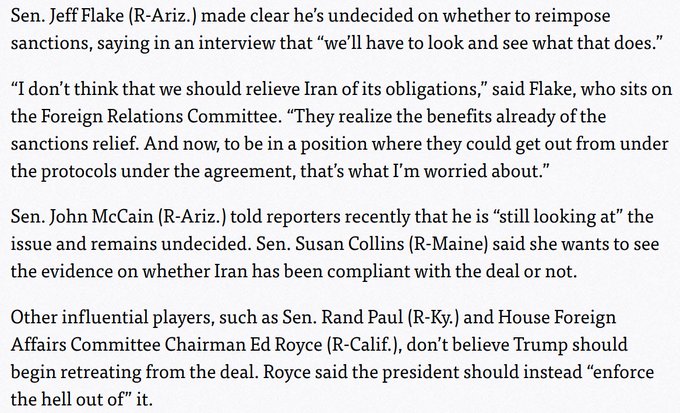Now the White House faces its latest deadline Oct. 15 to certify to Congress that Iran is in compliance with the terms of the deal. Trump has grudgingly given that approval two times this year, but has loudly signaled that he won't keep doing so. Speculation over the deal's demise has given a wing to a flurry of op-eds from neoconservative wonks and Iran hawks in Washington, cheering on possible decertification.
But there's a crucial constituency that may not be on the same page as Trump: his generals. On Tuesday, Defense Secretary Jim Mattis, a retired Marine general, appeared before the Senate Armed Services Committee and fielded questions on the administration's thinking regarding the Iran deal.
During the hearing, Senator Angus King (I-Maine) asked Mattis: Do you believe its in our national security interest at the present time to remain in the JCPOA? (The JCPOA, or Joint Comprehensive Plan of Action, is the formal term for the Iran deal.)
Yes, Senator, I do, Mattis responded.
He also stated that If we can confirm that Iran is living by the agreement, if we can determine that this is in our best interest, then clearly we should stay with it I believe at this point in time, absent indications to the contrary, it is something that the president should consider staying with. Iran's Press TV pointedly featured the comments on its social media accounts.
Mattis, known for his antipathy toward Iran, is hardly the sort of official whom conservatives can deride as an appeasenik nor was he the only Marine in the room to back the deal. Gen. Joseph F. Dunford Jr., the chairman of the Joint Chiefs of Staff, said that Iran is not in material breach of the deal and that the agreement's implementation has delayed the development of nuclear capability by Iran precisely as the Obama administration intended.
But the White House sees things differently from the Pentagon. Trump insists that Iran has abrogated the terms of the agreement in spirit by testing ballistic missiles and continuing its destabilizing activities in the Middle East. A move by Trump to decertify Iran would give Congress two months to decide whether to restore sanctions on Tehran an act that could compel Iran to renege on its own commitments. (Congress could also possibly do nothing and let the deal slumber on with European partners taking the lead, which they have pledged to do.)
Another path fervently sought by some Iran hawks is for Congress to use the opportunity to force a renegotiation and expansion of the deal to make it broader than a simple arms control agreement. Critics say the prospect of such a renegotiation is fantasy and, in an interview with Politico's Susan Glasser, Iranian Foreign Minister Javad Zarif rejected it outright.
The belief that such an outcome is possible is deeply rooted in a fundamental critique of the Iran deal advanced by some Israeli officials, conservative think tanks, and Trump himself: the idea that Obama simply lacked the skill and political will to push for tougher terms when the JCPOA was struck in July 2015, wrote Colin Kahl, a former Obama administration official. Theres just one problem: It's a myth. More pressure would not have produced a better outcome two years ago and threatening to blow up the deal will not produce a better one today.
The United States will be seen as having violated a deal that was working, the Iranians will feel free to resume their nuclear activities, and the strong international coalition that forced Iran to the table in the first place with its global sanctions will be impossible to put back together, wrote Philip Gordon of the Council on Foreign Relations in The Washington Post.
Gordon, who also served in the Obama administration, added: Trying to suddenly conjure up a brand-new deal that addresses every problematic aspect of Irans foreign policy and blocks its path to a nuclear weapon is a recipe for achieving neither set of goals.
View image on Twitter

Follow
Republicans who opposed Iran deal under Obama now think it may be worth saving under Trump, Politico reports:http://www.politico.com/story/2017/10/03/trump-iran-nuclear-deal-republicans-243375
1:43 PM - Oct 3, 2017
Nevertheless, there's a real likelihood that Trump will punt the matter to Congress, passing the buck to an already divided and dysfunctional body. This could very easily take on a momentum of its own, warned Jon Finer, the chief of staff to one of the Iran deal's key architects, former secretary of state John F. Kerry. You could be in a situation where the administration [won't certify compliance] and Congress will say, Well, the administration has spoken as to Irans implementation of the deal, and this moves forward whether or not people have fully thought through the consequences.
One of the consequences of the deal collapsing could be the resumption of Iran's nuclear program, prompting yet another nuclear-tipped geopolitical crisis. I know there are some Republicans who are so rabidly against the agreement they might vote to impose sanctions, said Sen. Chris Murphy (D-Conn.) to Al-Monitor, but I have to believe there are enough reasonable Republicans that they wouldnt put both North Korea and Iran on a pathway to nuclear weapons.
Whatever the mood in Washington, a new poll from the Chicago Council on Global Affairs found that a clear majority of Americans say that the United States should stick to the deal. The country's top defense officials seem to share that view. But it's still doubtful that the commander in chief is listening.










